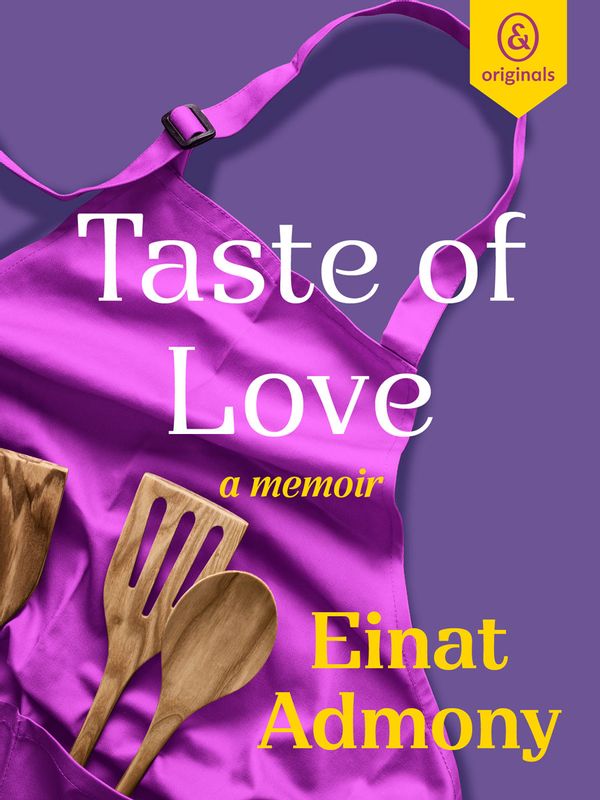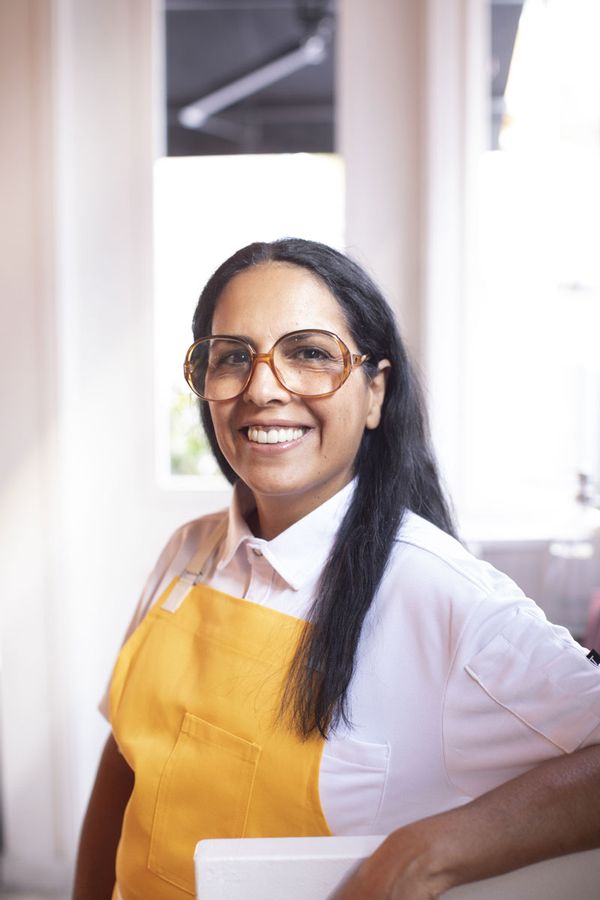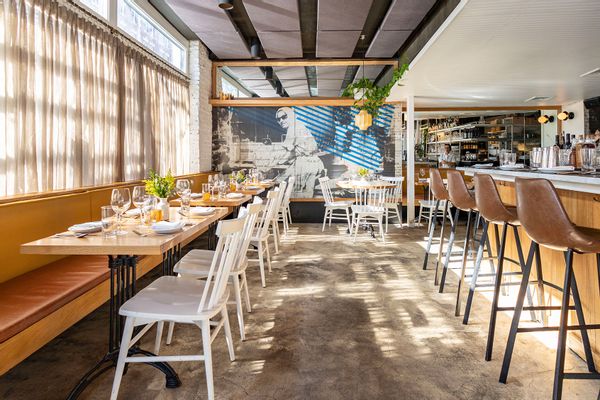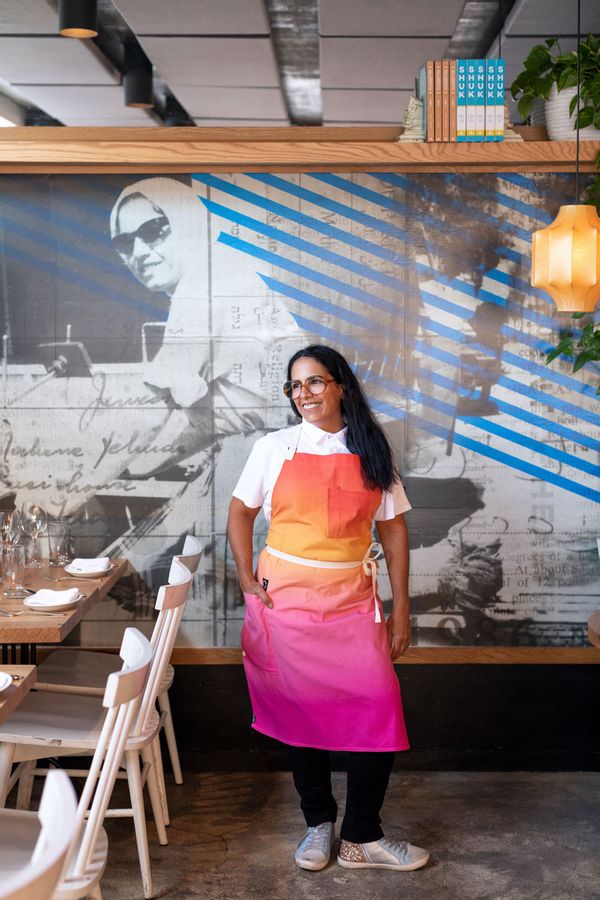Einat Admony — a two-time James Beard semifinalist, cookbook author, comedian and chef-owner of the widely acclaimed Balaboosta and Taim — is now adding a new title to that list: Memoirist.
Admony, who grew up in Tel Aviv before coming to the States and pursuing all things culinary, is veering outside of the confines of restaurants and cookbooks by delving deep into her personal life, writing in bold, vulnerable ways about her relationships, her upbringing, her love of food and cooking, her family and much more.
Salon Food was able to chat with Admony about the memoir, titled "Taste of Love," as well as her interest in stand-up comedy, her growing up in Israel, her restaurants, why she cooks, her tips for cutting down on food waste and what might possibly be next for her.
 Taste of Love by Einat Admony (Courtesy of Everand /Cover design by Catherine Casalino)
Taste of Love by Einat Admony (Courtesy of Everand /Cover design by Catherine Casalino)
The following interview has been lightly edited for clarity and length.
Hello! Your writing has such a propulsive element to it, whether discussing food or something immensely personal or intimate. What initially got you into writing? What led you to want to write a memoir of sorts?
I have experienced so many things in my life, so I find I always have a good story to tell. Earlier in my career, I thought that to compete with men, I had to act tough, but at this point in my life, I don’t mind being vulnerable and completely honest. I want to share my stories and show others that being open isn’t a negative thing.
Beside the obvious distinctions, how does the memoir differ from your cookbooks?
To be frank, in my brain, writing a cookbook and writing a memoir are barely related. I put love into my recipes, I wear my heart on my sleeve and am pretty open about my emotions, but having to put thoughts I had never even said out loud onto the page was a totally different experience. Also, my cookbooks would be G-rated, while this memoir could be rated R.
How did it feel putting such personal content on these pages?
Writing this book felt liberating. Being able to reflect on the moments from my past was therapeutic in a way; it allowed me to break down the emotions I was feeling at the time and realized how they impacted me going forward. I also loved walking down memory lane and reliving the exciting and fun parts of my life. I have a personality with no apologies and am fully authentic, so getting to express myself in this way was exciting.
 Einat Admony (Photo by Heidi Harris)
Einat Admony (Photo by Heidi Harris)
Your writing about your formative days with Stefan in the memoir are so lovely and momentous, especially knowing what's to come! What was it like to revisit those moments?
When I look at Stef now, I see the father of my children, my business partner, my biggest supporter, the love of my life and my best friend, but revisiting my early days with him was a great reminder of why, after 21 years, we are still together. It was a great reminder of why I still haven’t gotten past the crush I had on him when we first met.
Was there any aspect of writing the book — no matter if the actual act of writing or the possible pain of relieving some of the more challenging moments — that you decidedly did not love about working on the memoir?
No part of writing was totally uncomfortable, but a lot of that should be credited to the amazing help I got from my brother-in-law Joel Chasnoff, who was a major help in writing this book.
The only thing that I hesitated on when writing the book was bringing the audience into the bedroom with my husband and me. Telling these stories left me feeling exposed.
Why do you cook?
Asking why I cook is like asking why I breathe. It is an innate part of me. It is the best therapy I could ever find and the best channel to express my love. It is how I am able to push through grief and help others through it as well. Cooking keeps me present by using all my senses.
We need your help to stay independent
Tell our readers a bit about your upbringing and how you wound up getting into food professionally?
I grew up with an immigrant mom from Iran and a Yemenite dad who was born in Israel. When I was a teenager, my parents became very religious, which resulted in a very rebellious person.
After serving two years in the Israeli Airforce, I spent three months in college before dropping out — I was too smart for it anyway [wink]. I decided to leave Israel and spent four and a half years traveling through Europe in a small RV.
In my mid-20s, I decided I needed to straighten out my life. As someone who had always lived a fast-paced lifestyle, I realized the one and only thing I could do for a living without getting bored was cooking. So, I went back to Israel for culinary school.
Cooking saved my life more than once. I would be a completely different person with a completely different life had I not turned to cooking. I would have continued chasing my tail, without feeling any sense of accomplishment for the rest of my life had cooking not saved me.
 Balaboosta dining room (Photo by Peter Bonacci)
Balaboosta dining room (Photo by Peter Bonacci)
What are some of your earliest food memories?
Rosh Hashana dinners with the whole family. Around 20 cousins, making up 5 different families, would crowd around a packed-to-the-edge table to eat the most delicious Persian feast you can imagine. The table was filled with bright colors like juicy, red pomegranate seeds and verdant herbs that Persian food is known for. Every mom brought their specialty: my mom made her black chicken, also called fessanjoon chicken, Aunt Hannah would cook her Persian rice and Aunt Ester would always bring a roast lamb.
Balaboosta is arguably your magnum opus, if you will, restaurant-wise. How would you describe its ethos to someone unfamiliar with it?
Balaboosta is a place will make you feel at home, even if you come from a region that makes food totally different than the food we represent. Balaboosta is casual and comfortable, but still elevated and sophisticated. The food is approachable but will expand your palate and excite your taste buds.
How do you embody the term "balaboosta" at the restaurant itself?
“Balaboosta” is a Yiddish term basically meaning “the ultimate housewife.” Not in a “cook, take care of the kids and submit to your husband” kind of way, but in a “run the household and make sure everyone is happy” kind of way. That is how I want people to feel when they come to Balaboosta—happy and taken care of, like someone is hosting them in their home.
Both Balaboosta and Taim are incredibly successful, but in such different ways. Can you speak a bit about that?
When Stefan and I opened Taim, we wanted use our fine-dining backgrounds and translate that into a quick-service restaurant. We wanted to do the impossible—use quality ingredients, have an intense attention to detail and provide top-quality hospitality in a tiny space serving cheap food that many people were unfamiliar with. We wanted to fill the void of middle eastern restaurants in NYC that existed at that time.
When I first opened Balaboosta, New York Magazine named it as one of 2011’s Best New Restaurants. The quote they used to describe the place was: “Einat Admony proves she is more than just Manhattan’s falafel queen.” While I never cook for the notoriety, when I opened Balaboosta I did feel I need to prove that I could make upscale food, not just street food. I also knew that if I wanted to have any time with my two children, I couldn’t open a true fine-dining restaurant. To have any semblance of a work-life balance, I had to find a middle ground between a restaurant with white tablecloths and a $400 tasting menu and what I had built at Taïm.
I once read that you were one of the foremost chefs to "introduce Israeli cuisine" to the U.S. Is that something you set out to do or was it more so happenstance?
When I came in 1999, in most American’s minds Jewish food [equals] Ashkenazi food. There wasn’t much talk about Mizrahi food, or Mizrahi Jews in general. As one of only Mizrahi Jewish chefs in US at the time, I was determined to educate others and share my heritage.
What stands out for you as a formative moment that got you into cooking or food at large?
It was a million different moments, but one that really stands out is from my time living in a teeny RV in Europe. I grabbed a few shitty ingredients from Aldi and cooked for my friends in my RV. They were shocked by what I was able to throw together. Watching their reactions—joy, satisfaction, surprise—while eating my food made me realize what cooking could be.
You've appeared on "Chopped" and "Guy's Tournament of Champions." Are you looking to get into more food TV at all — or is the kitchen where you most like to be?
I love working on TV shows, so I definitely see myself on screen again in the future, but I’m looking into different genres than what I have done so far. But I never want to be totally removed from my kitchens.
 Einat Admony in Balaboosta dining room (Photo by Heidi Harris)
Einat Admony in Balaboosta dining room (Photo by Heidi Harris)
Can you tell me a bit about your comedy?
I started doing standup because I was looking for a new challenge. I wanted it to be unrelated to cooking and hospitality and something I could do on my own. If there is one thing I love in life it’s comedy, so getting to learn the structure of it and be a part of the standup scene in New York has been such a joy.
I also just wanted to see if I had the balls to actually do it. Comedy is something that scares me and makes adrenaline pump through me. There is a big difference between doing a cooking demo for 300 people and trying to make 50 ppl laugh. Even having performed at the Comedy Cellar several times, I’m still debating if I have the balls to do it.
Want more great food writing and recipes? Subscribe to Salon Food's newsletter, The Bite.
What’s your biggest tip for cutting down on food waste?
The thing about food waste is there isn’t one solution, so I’ll give a few broad pieces of advice.
- Learn how to pickle, ferment and preserve everything.
- Check out every possible way to use up things like carrot tops and beet greens.
- Always use a rubber spatula to make sure you get everything out of your bowl.
- Run your thumb along the inside of a seemingly empty egg shell to make sure you aren’t leaving any of the egg white behind.
How do you practice sustainability, both at home and in your restaurants?
It is much easier to be sustainable when you have space. At my house in Upstate, New York, I am lucky to have my own chickens, ducks and a huge garden that provide food for my family and my restaurant. There I also am able to compost all of my food for use in my garden.
You've accumulated so many accolades over the years, primarily within food, but now also in tv, comedy and writing. Where would you love to see our career go next?
I want to continue doing what I’m doing now. I want to be able to cook. I also wouldn’t hate to do more tv.
Click here for a code for a 60 day free trial of Everand to read "Taste of Love!"



Shares